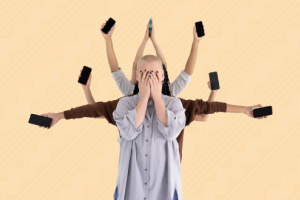Social media has become an integral part of our daily lives, with millions of people using it to connect with friends and family, share their thoughts and experiences, and stay up to date on current events. However, there is growing concern about the impact of social media on mental health. From FOMO and low self-esteem to sleep deprivation and online trolling, social media can have a range of negative effects on our mental well-being. In this article, we will explore some of the most significant impacts of social media on mental health and in the next article, we’ll discuss ways to mitigate these effects.
As you know, using social media can have positive and negative aspects.
The positive aspects of social media
Social media enables you to:
- Communicate and keep in touch with relatives and friends all across the world.
- Make new friends and join new communities; network with those who have similar interests or goals.
- Volunteer for or support worthy causes; raise awareness about vital topics.
- Seek or provide emotional assistance during difficult times.
- Find crucial social connections if you live in a remote area, have limited independence, have social anxiety, or are a member of a marginalized group, for example.
- Find a way to express your creativity and self-expression.
- Locate (with caution) sources of useful information and learning.
The negative aspects of social media
Because social media is a relatively new technology, there has been little research to determine the long-term effects, positive or negative, of its use. Multiple studies, however, have identified a substantial correlation between excessive social media use and an increased risk of melancholy, anxiety, loneliness, self-harm, and even suicide ideation.
Social media may promote negative experiences such as:
-
Inadequacy about your life or appearance.
Social media images can make us feel insecure and envious, even if they are manipulated. People tend to share the highlights of their lives, not the low points. This can lead to feelings of envy and dissatisfaction when scrolling through friends’ photos.
-
Fear of missing out (FOMO).
FOMO (fear of missing out) is a common problem on social media sites such as Facebook and Instagram. It can lead to feelings of self-esteem, anxiety, and addiction. FOMO can lead to taking risks while driving, missing out on sleep, or prioritizing social media interaction over real-world relationships. This can lead to taking risks while driving, missing out on sleep, or prioritizing social media interaction over real-world relationships.
-
Isolation.
A study at the University of Pennsylvania discovered that frequent use of Facebook, Snapchat, and Instagram enhances rather than lowers feelings of loneliness. In contrast, the study discovered that limiting your use of social media can help you feel less lonely and isolated, as well as increase your general well-being.
-
Depression and anxiety.
Humans need face-to-face contact to be intellectually healthy, as eye contact with someone who cares about them can reduce stress and improve mood. Social media interaction over in-person connections can lead to mood disorders like anxiety and depression.
-
Cyberbullying.
Approximately 10% of teens report being bullied on social media, while many other users receive nasty comments. Twitter, for example, can be a hotspot for spreading damaging rumors, lies, and abuse that can cause long-lasting emotional scars.
Signs that social media is impacting your mental health.
Everyone is different and there is no specific amount of time spent on social media that indicates it is becoming unhealthy. It has to do with the impact it has on your mood and other aspects of life, as well as your motivations for using it. For example, if it causes you to neglect face-to-face relationships, distracts you from work or school, or leaves you feeling envious, angry, or depressed, it may be time to reassess your social media habits.
Indicators that social media may be adversely affecting your mental health include:
-
Spending more time on social media than with real-world friends.
Using social media has replaced most of your offline social engagement. Even when you’re out with friends, you feel the need to continually check social media, which is often motivated by the fear that others are having more fun than you.
-
Making unfavorable comparisons to others on social media.
You lack self-esteem or have a negative body image. You may even have problematic eating patterns.
-
Being subjected to cyberbullying.
As a result, you are concerned that you have no control over what others post about you.
-
Distractions at school or work.
You feel pressured to post about yourself regularly, to receive comments or likes on your postings, or to respond immediately and enthusiastically to your friends’ posts.
-
No time for self-reflection.
You spend every free moment on social media, leaving little or no time to focus on who you are, what you think, or why you act the way you do—the things that allow you to evolve as a person.
-
Taking chances to obtain likes, shares, or positive replies on social media.
You engage in harmful pranks, upload embarrassing content, cyberbully people, or use your phone while driving or in other potentially hazardous situations.
-
Having difficulty sleeping.
Do you check social media at the end of the day, first thing in the morning, or even when you wake up in the middle of the night? The light from phones and other electronics can interfere with your sleep, which can lead to insomnia.
In conclusion, social media has both positive and negative impacts on mental health, so it is important to always prioritize your mental health and well-being and use social media in a way that supports and enhances your life, rather than detracting from it. Take care!

